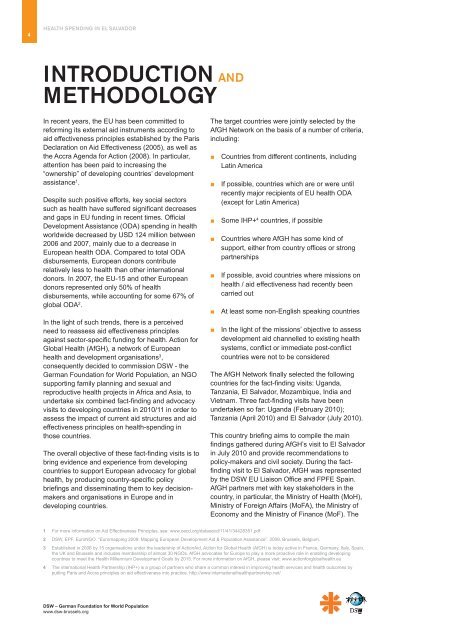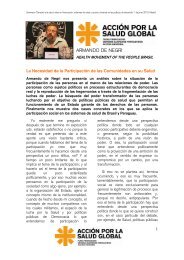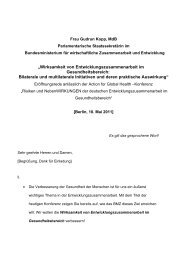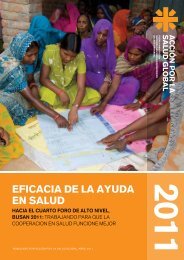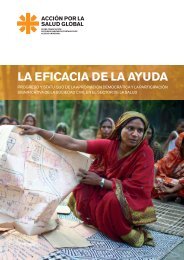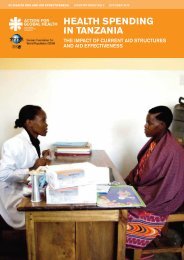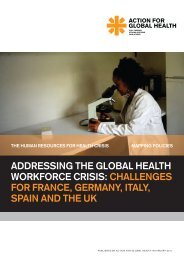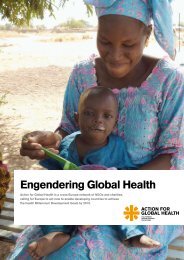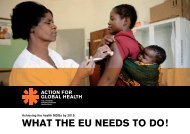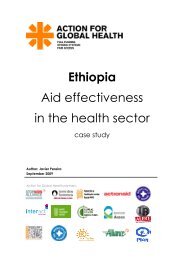HEALTH SPENDING IN EL SALVADOR - euroresources.org
HEALTH SPENDING IN EL SALVADOR - euroresources.org
HEALTH SPENDING IN EL SALVADOR - euroresources.org
Create successful ePaper yourself
Turn your PDF publications into a flip-book with our unique Google optimized e-Paper software.
4<br />
<strong>HEALTH</strong> <strong>SPEND<strong>IN</strong>G</strong> <strong>IN</strong> <strong>EL</strong> <strong>SALVADOR</strong><br />
<strong>IN</strong>TRODUCTION AND<br />
METHODOLOGY<br />
In recent years, the EU has been committed to<br />
reforming its external aid instruments according to<br />
aid effectiveness principles established by the Paris<br />
Declaration on Aid Effectiveness (2005), as well as<br />
the Accra Agenda for Action (2008). In particular,<br />
attention has been paid to increasing the<br />
“ownership” of developing countries’ development<br />
assistance 1 .<br />
Despite such positive efforts, key social sectors<br />
such as health have suffered significant decreases<br />
and gaps in EU funding in recent times. Official<br />
Development Assistance (ODA) spending in health<br />
worldwide decreased by USD 124 million between<br />
2006 and 2007, mainly due to a decrease in<br />
European health ODA. Compared to total ODA<br />
disbursements, European donors contribute<br />
relatively less to health than other international<br />
donors. In 2007, the EU-15 and other European<br />
donors represented only 50% of health<br />
disbursements, while accounting for some 67% of<br />
global ODA 2 .<br />
In the light of such trends, there is a perceived<br />
need to reassess aid effectiveness principles<br />
against sector-specific funding for health. Action for<br />
Global Health (AfGH), a network of European<br />
health and development <strong>org</strong>anisations 3 ,<br />
consequently decided to commission DSW - the<br />
German Foundation for World Population, an NGO<br />
supporting family planning and sexual and<br />
reproductive health projects in Africa and Asia, to<br />
undertake six combined fact-finding and advocacy<br />
visits to developing countries in 2010/11 in order to<br />
assess the impact of current aid structures and aid<br />
effectiveness principles on health-spending in<br />
those countries.<br />
The overall objective of these fact-finding visits is to<br />
bring evidence and experience from developing<br />
countries to support European advocacy for global<br />
health, by producing country-specific policy<br />
briefings and disseminating them to key decisionmakers<br />
and <strong>org</strong>anisations in Europe and in<br />
developing countries.<br />
The target countries were jointly selected by the<br />
AfGH Network on the basis of a number of criteria,<br />
including:<br />
■ Countries from different continents, including<br />
Latin America<br />
■ If possible, countries which are or were until<br />
recently major recipients of EU health ODA<br />
(except for Latin America)<br />
■ Some IHP+ 4 countries, if possible<br />
■ Countries where AfGH has some kind of<br />
support, either from country offices or strong<br />
partnerships<br />
■ If possible, avoid countries where missions on<br />
health / aid effectiveness had recently been<br />
carried out<br />
■ At least some non-English speaking countries<br />
■ In the light of the missions’ objective to assess<br />
development aid channelled to existing health<br />
systems, conflict or immediate post-conflict<br />
countries were not to be considered<br />
The AfGH Network finally selected the following<br />
countries for the fact-finding visits: Uganda,<br />
Tanzania, El Salvador, Mozambique, India and<br />
Vietnam. Three fact-finding visits have been<br />
undertaken so far: Uganda (February 2010);<br />
Tanzania (April 2010) and El Salvador (July 2010).<br />
This country briefing aims to compile the main<br />
findings gathered during AfGH’s visit to El Salvador<br />
in July 2010 and provide recommendations to<br />
policy-makers and civil society. During the factfinding<br />
visit to El Salvador, AfGH was represented<br />
by the DSW EU Liaison Office and FPFE Spain.<br />
AfGH partners met with key stakeholders in the<br />
country, in particular, the Ministry of Health (MoH),<br />
Ministry of Foreign Affairs (MoFA), the Ministry of<br />
Economy and the Ministry of Finance (MoF). The<br />
1 For more information on Aid Effectiveness Principles, see: www.oecd.<strong>org</strong>/dataoecd/11/41/34428351.pdf<br />
2 DSW, EPF, EuroNGO. “Euromapping 2009: Mapping European Development Aid & Population Assistance”. 2009, Brussels, Belgium.<br />
3 Established in 2006 by 15 <strong>org</strong>anisations under the leadership of ActionAid, Action for Global Health (AfGH) is today active in France, Germany, Italy, Spain,<br />
the UK and Brussels and includes membership of almost 30 NGOs. AfGH advocates for Europe to play a more proactive role in enabling developing<br />
countries to meet the Health Millennium Development Goals by 2015. For more information on AfGH, please visit: www.actionf<strong>org</strong>lobalhealth.eu<br />
4 The international Health Partnership (IHP+) is a group of partners who share a common interest in improving health services and health outcomes by<br />
putting Paris and Accra principles on aid effectiveness into practice. http://www.internationalhealthpartnership.net/<br />
DSW – German Foundation for World Population<br />
www.dsw-brussels.<strong>org</strong>


